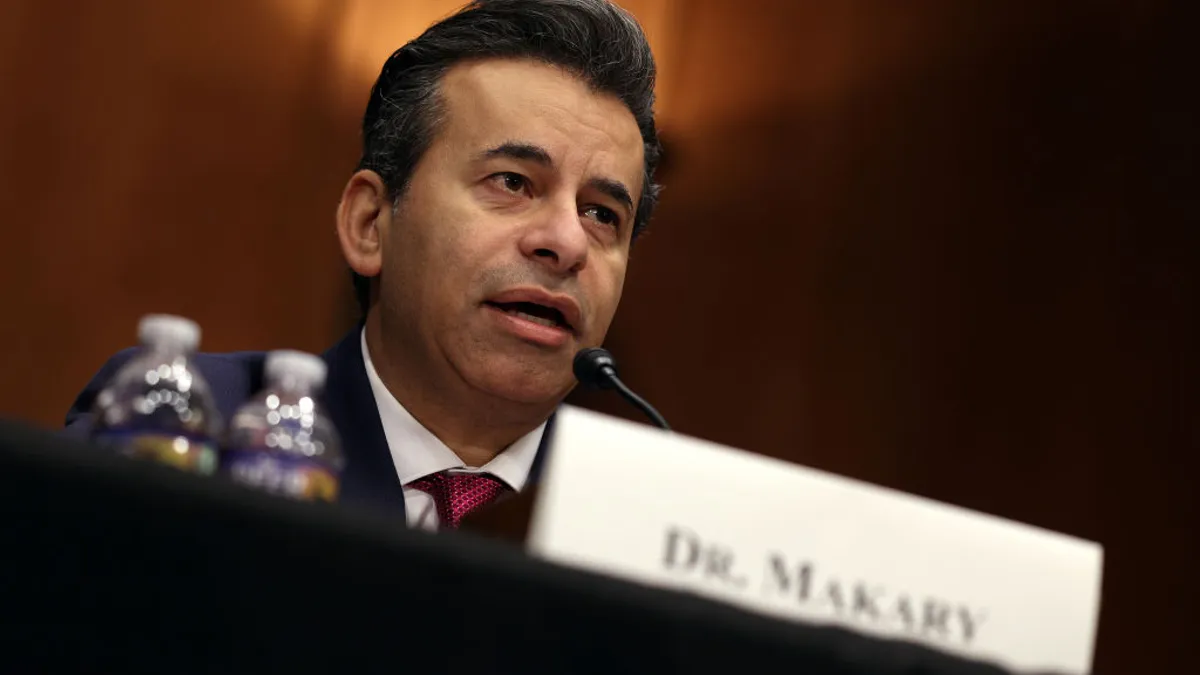While medtechs are still at least a month away from reporting third-quarter results, several in the industry cast notes of optimism that the newly begun fourth quarter will bring a return to growth in a year otherwise disrupted by COVID-19.
At the Morgan Stanley Global Healthcare Conference this week, executives at major medtechs including Boston Scientific, Medtronic, Edwards Lifesciences and Stryker shared the latest on month-to-month business recovery and what they're focused on as healthcare systems hopefully stabilize.
Here's some of what they had to say:
Medtronic's new CEO talks tech priorities
CEO Geoff Martha, only five months into the top spot at Medtronic, said September business trends improved over August, and a return to profitability may arrive sooner than the fourth quarter if those trends continue.
Martha elaborated on key talking points from last month's earnings call — including a restructuring of Medtronic's divisions and new investment and initiatives in diabetes — and also delved into some of the company's current thinking on technology.
"This whole convergence of digital technology that's coming into medtech," such as data and AI, 5G, and edge computing, Martha said, "we need to not just embrace it but speed it up."
Further: "Everything we sell needs to be connected to the cloud. And we've got to have faster processing power on our devices, because the way we do R&D in medtech, we're dealing with two-, three-generation old chip computational power because of the way the approval process goes with the regulators. So we've got to fix that."
Martha also said that under the company's new operating model, there's a goal to not be "outspent" in any sector or end market. "If we feel like we're being outspent, we’ll figure out a way to be competitive there or exit the market if we just can't prioritize it."
Martha teased more details to come on the company's recently announced restructuring plan at an Oct. 14 analyst day.
Boston Scientific leans on Watchman, Exalt D
Boston Scientific CEO Mike Mahoney said Wednesday morning the company is again ramping up clinical trials and product launches amid monthly improvement since the pandemic's worst springtime hit. While the company still expects to see positive growth in the fourth quarter, he acknowledged performance is heavily dependent on how a potential change in COVID-19 cases at the end of the year could affect healthcare systems.
When pushed on the business contribution of its Lotus Edge TAVR device compared to competitors Medtronic and Edwards, Mahoney said "even small share gains are significant for us." He called Lotus an important growth driver, but also said there are "other offsets" in that division, namely its Watchman implant meant to reduce stroke risk in atrial fibrillation patients. Mahoney said the rollout of the latest version of the device, dubbed Watchman FLX, will continue through the end of this year and into 2021.
Mahoney and Morgan Stanley analyst David Lewis also discussed Exalt D, Boston Scientific's FDA-cleared single-use duodenoscope, whose launch this year has been "extremely impacted by COVID-19" but is picking up momentum this quarter, Mahoney said. One recent catalyst to adoption is CMS' decision to pay for the device despite the fact that cost data is still being collected.
As for M&A, Mahoney said Boston Scientific has been mostly focused on its venture portfolio since closing the $4.2 billion buyout of BTG last year, and that tuck-in acquisitions will be part of its strategy over the next 18 months.
Edwards affirms Q4 growth target
Edwards Lifesciences CFO Scott Ullem confirmed the company's growth outlook given in July for a rebound from pandemic-driven lows in late March and April. The heart valve specialist expects to produce flat year-over-year sales in the third quarter, followed by a growing fourth quarter.
"We do think we'll be growing again by the fourth quarter, but we're still expecting ups and downs, probably flair-ups in certain regions that affect certain systems," Ullem said. "In terms of when we get back to something that's truly normal, that seems like quite a ways off."
Ullem declined to comment on claims of market share gains by Medtronic, its transcatheter aortic valve replacement market rival. Noting that only about 10% of patients with severe symptomatic aortic stenosis currently get treated with TAVR, Ullem said Edwards was focused on improving treatment rates. "We'll do just fine, as patients continue to get treated at a higher rate," he said.
Stryker says robot momentum growing amid pandemic
Stryker CEO Kevin Lobo said a rebound in company sales since the initial downturn at the start of the pandemic has happened much faster than expected. Consecutive monthly sales have staged a V-shaped recovery from a low in April of down 36%, compared with a year ago, back to pre-pandemic levels in July and August. The company's order book for capital equipment is "very healthy" through the end of the year, Lobo said.
The acquisition of Wright Medical, expected to close in early October, will add to the company's growth rate and give Stryker the top market share position in both upper and lower extremities, Lobo touted, as Stryker will continue to look for smaller tuck-in deals amid the big integration.
The total number of Mako robot installs has now passed 1,000, Lobo said, reiterating an acceleration of sales to ambulatory surgery centers. Lobo framed new competition from Zimmer Biomet's Rosa system as having expanded the market by prodding customers to commit to a purchase. He also elaborated on Stryker's intention to integrate Mako with Wright's devices such as shoulder implants.
As for product introductions happening now, Lobo highlighted a next-generation flow-diverting neurovascular stent called Surpass Evolve and a just-launched wireless hospital bed with fall prevention features as important new products.



















